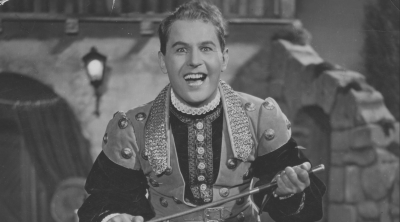Jan Kiepura (1902–1966)

Whilst filming “Mein Herz ruft nach Dir” he met the great Hungarian actress and singer, Marta Eggerth. They were married in 1936 and remained together for the rest of their life. They were regarded as a dream couple and sang together on all the great stages of the world, as well as appearing in the most successful films of the time. Their greatest joint success was the film, “Zauber der Bohème”.
At the end of the 1930s Jan Kiepura made a succession of negative comments about Nazi Germany in the Polish media and, as a result, all the films featuring Kiepura and his wife were banned in Germany in 1938.
The news of the outbreak of World War II on 1 September 1939 reached Marta Eggerth and Jan Kiepura while they were filming the novel “Manon” in France. After a short intermezzo with the Polish army in exile Jan Kiepura decided to move to the USA via the south of France. This could not have been an easy decision for him. He always emphasised his Polish origins and his love of his Polish homeland. Nonetheless Kiepura remained committed to the people of Poland in his own way. He sang at many benefit concerts and collected money for Polish citizens in need. One of the organisations to whom he donated money was the “Fundusz Pomocy Polsce” (Polish Relief Fund). Along with his wife he supported European refugees who had emigrated to the USA. In this way a huge amount of people benefited from their immense aid in difficult times.
In America Jan Kiepura was hired by the Metropolitan Opera in New York. From now on America was his main source of employment. In 1953 he even became an American citizen. Apart from a six-year stay in Paris (1948 - 1954) he lived in the USA. Paris was now his European centre, from which he organised tours of Europe. He was also loved visiting Germany, example the time when he was a star guest at the Berlin Film Festival in 1952. In 1958 Jan Kiepura finally returned to Poland after 19 years. Here he gave 15 recitals, all of which were greeted with standing ovations from huge enthusiastic audiences. This was important both for him and his fans, for communist propaganda continually tried to discredit Jan Kiepura as a traitor to his fatherland.
Even though Jan Kiepura mostly worked in films he remained a successful opera singer for the rest of his life. In June 1966 he signed a new contract with the Metropolitan Opera in New York, but two months later on 15th August he died of a heart attack in his house in Harrison (USA). His funeral took place in Warsaw. 100,000 people lined the streets on the way to his grave in the most famous cemetery in Warsaw,“Powązki”.
Adam Gusowski, March 2016
















